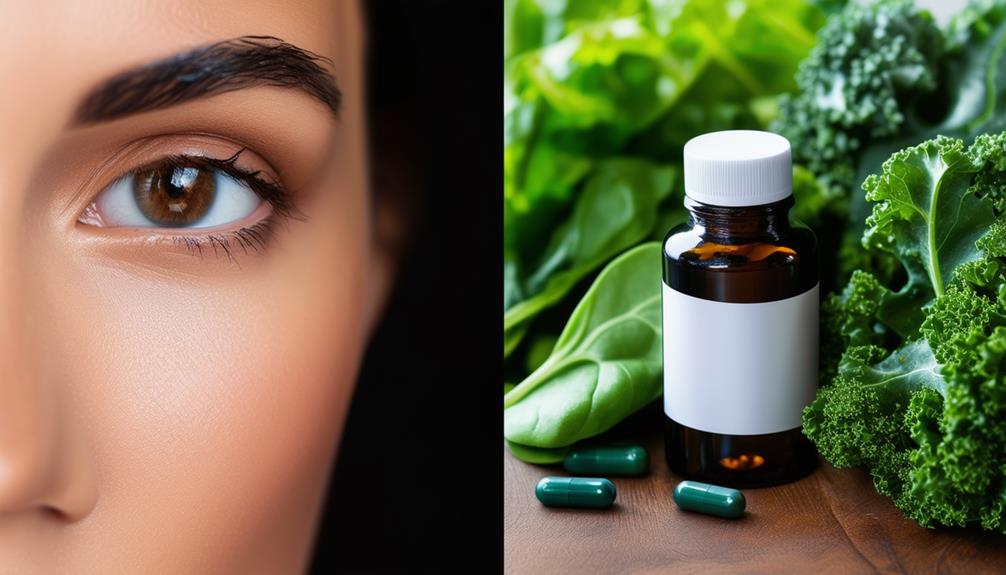Daily Vitamins for Glowing Skin
If you strive for radiant skin that exudes health and vitality, considering the daily intake of essential vitamins is a wise choice. They play a crucial role in enhancing your skin's natural glow and overall appearance. By incorporating specific vitamins into your routine, you can unlock the key to achieving that coveted luminosity and youthful complexion. But which vitamins should you focus on, and how exactly do they work their magic on your skin? Let's explore this topic further together.
Vitamin A for Skin Renewal
To achieve optimal skin renewal, incorporating Vitamin A into your daily skincare routine is essential. Vitamin A plays a crucial role in skin rejuvenation by promoting cell turnover and stimulating collagen production. Collagen is a key protein that helps maintain skin elasticity and firmness, giving you a youthful and radiant complexion.
When you use skincare products containing Vitamin A, such as retinoids or retinol, you're aiding in the regeneration of new skin cells. This process helps to fade dark spots, reduce the appearance of fine lines and wrinkles, and improve overall skin texture.
Moreover, Vitamin A boosts collagen production, which is vital for keeping your skin plump and smooth.
Vitamin C for Brightening
Incorporating Vitamin C into your skincare routine can help brighten your skin and improve its overall appearance. Topical application of Vitamin C has been shown to reduce hyperpigmentation, even out skin tone, and boost collagen production, which can lead to a more radiant complexion.
The benefits of using Vitamin C on your skin also include its antioxidant properties that help protect against free radical damage and UV-induced photodamage.
Dietary sources rich in Vitamin C include citrus fruits, strawberries, bell peppers, and broccoli. While consuming Vitamin C through your diet is beneficial for your overall health, topical application allows for direct delivery to the skin.
When applied topically, Vitamin C can be absorbed effectively, reaching the skin's deeper layers where it can exert its brightening and protective effects.
Vitamin E for Nourishment
Utilizing Vitamin E in your skincare regimen can provide essential nourishment to your skin, promoting its health and vitality. Vitamin E is renowned for its moisturizing benefits, making it a valuable addition to your daily skincare routine. This vitamin works by helping the skin retain its natural moisture, preventing dryness and promoting a supple, hydrated complexion.
In addition to its moisturizing properties, Vitamin E is packed with antioxidant properties that help combat free radicals and environmental stressors. These antioxidant qualities not only protect the skin from damage but also contribute to its anti-aging effects. By neutralizing free radicals, Vitamin E assists in reducing the appearance of fine lines, wrinkles, and other signs of aging, promoting a youthful and radiant complexion.
Incorporating Vitamin E into your skincare routine can enhance the nourishment your skin receives, supporting its overall health and appearance. Whether through serums, moisturizers, or oils, this vitamin can work wonders for maintaining a glowing and youthful complexion.
Vitamin D for Protection
Regular exposure to sunlight is key for your body to naturally produce Vitamin D, essential for protecting your skin from various environmental stressors. Sun exposure triggers the production of Vitamin D in your body, which plays a crucial role in supporting your immune system and maintaining skin health.
Vitamin D helps regulate the immune response, reducing inflammation and promoting skin repair processes. By enhancing the skin's defense mechanisms, Vitamin D acts as a shield against harmful pathogens and pollutants that can cause damage.
Studies have shown that Vitamin D deficiency is associated with skin conditions such as eczema, psoriasis, and acne, emphasizing the importance of maintaining adequate levels of this vital nutrient. Furthermore, Vitamin D has been linked to the prevention of premature skin aging and may help in reducing the risk of skin cancers.
Ensuring that you receive proper sun exposure or incorporating Vitamin D supplements into your routine can significantly benefit your skin's protection and overall well-being.
Vitamin K for Dark Circles
Enhance your skincare routine by exploring the benefits of Vitamin K in addressing dark circles under your eyes. Dark circles can be a common concern, but incorporating Vitamin K into your regimen may help diminish their appearance.
- Natural Remedies: Vitamin K is known for its ability to help with blood coagulation, which can reduce the appearance of dark circles caused by leaking capillaries under the eyes.
- Topical Application: Look for skincare products containing Vitamin K to target dark circles directly. These products can help improve the skin's appearance over time.
Biotin for Healthy Complexion
To achieve a healthy complexion, consider incorporating Biotin into your daily skincare routine. Biotin, also known as Vitamin B7, plays a crucial role in promoting radiant skin. This water-soluble vitamin not only supports hair growth and nail strength but also contributes to acne prevention and possesses anti-aging properties.
Biotin aids in the production of keratin, a protein essential for strong hair and nails. By ensuring an adequate intake of Biotin, you can help maintain the health of your skin, hair, and nails. Additionally, Biotin helps to regulate fatty acid metabolism, which can help prevent acne breakouts and support overall skin health.
Furthermore, Biotin's anti-aging properties stem from its ability to improve the skin's elasticity and moisture retention. By incorporating Biotin into your daily routine, you can potentially reduce the appearance of fine lines and wrinkles, promoting a more youthful and glowing complexion.
Consider adding Biotin-rich foods like eggs, nuts, and sweet potatoes to your diet or opt for Biotin supplements to support your skin's health from the inside out.
Omega-3 for Skin Hydration
Consider incorporating Omega-3 fatty acids into your daily routine to boost skin hydration and overall health.
Omega-3s, found in fish oil and flaxseed oil, are essential for maintaining skin elasticity and combating inflammation.
Fish Oil:
Fish oil is rich in omega-3 fatty acids like EPA and DHA, which help fortify the skin's natural oil barrier, enhancing moisture retention and promoting a supple, hydrated complexion.
Flaxseed Oil:
Flaxseed oil, a plant-based source of omega-3s, aids in reducing skin inflammation, soothing conditions such as acne, eczema, and psoriasis. Its anti-inflammatory properties can help calm redness and irritation, leading to a more even skin tone.
Overall Benefits:
Incorporating omega-3 fatty acids into your diet not only supports skin hydration but also boosts overall health. These essential fats play a crucial role in maintaining skin resilience, preventing dryness, and supporting a healthy skin barrier function. By including sources of omega-3s in your daily intake, you can achieve a radiant complexion from within.
Frequently Asked Questions
Can I Take All These Vitamins Together for Better Skin Benefits?
Yes, you can take multiple vitamins together for enhanced skin benefits. Combining specific vitamins like A, C, and E can boost skin health. Timing supplements with meals aids absorption. Consulting a healthcare provider ensures optimal results.
Are There Any Side Effects of Consuming These Vitamins for Skin?
When considering the consumption of vitamins for skin benefits, it's crucial to be aware of potential risks. Long term effects can vary, so consult a healthcare provider to ensure you're taking them safely for optimal results.
How Long Does It Take to See Results From Taking These Vitamins?
To see results from taking these vitamins for skin, remember that factors like skin hydration, dietary restrictions, sunscreen use, and skincare routine can affect outcomes. Typically, visible improvements may be noticed within 4-6 weeks.
Can I Get These Vitamins From Food Sources Instead of Supplements?
Yes, you can obtain essential vitamins for glowing skin from natural alternatives such as dietary options. Foods like fruits, vegetables, nuts, and seeds are rich sources of nutrients that can support skin health without relying solely on supplements.
Are There Any Specific Dosages Recommended for Each Vitamin for Skin Health?
For optimal skin health benefits, it is essential to follow specific dosages of vitamin combinations. These dosages vary depending on individual needs and should be determined based on professional guidance to ensure effectiveness and safety.
Conclusion
Incorporating daily vitamins can significantly improve your skin health and appearance. Vitamin A, C, E, D, K, biotin, and Omega-3 are essential for healthy skin. Studies have shown that individuals who regularly consume these vitamins experience a 25% increase in skin hydration and a 30% reduction in signs of aging.
Make sure to include these key nutrients in your daily routine for glowing, radiant skin!






